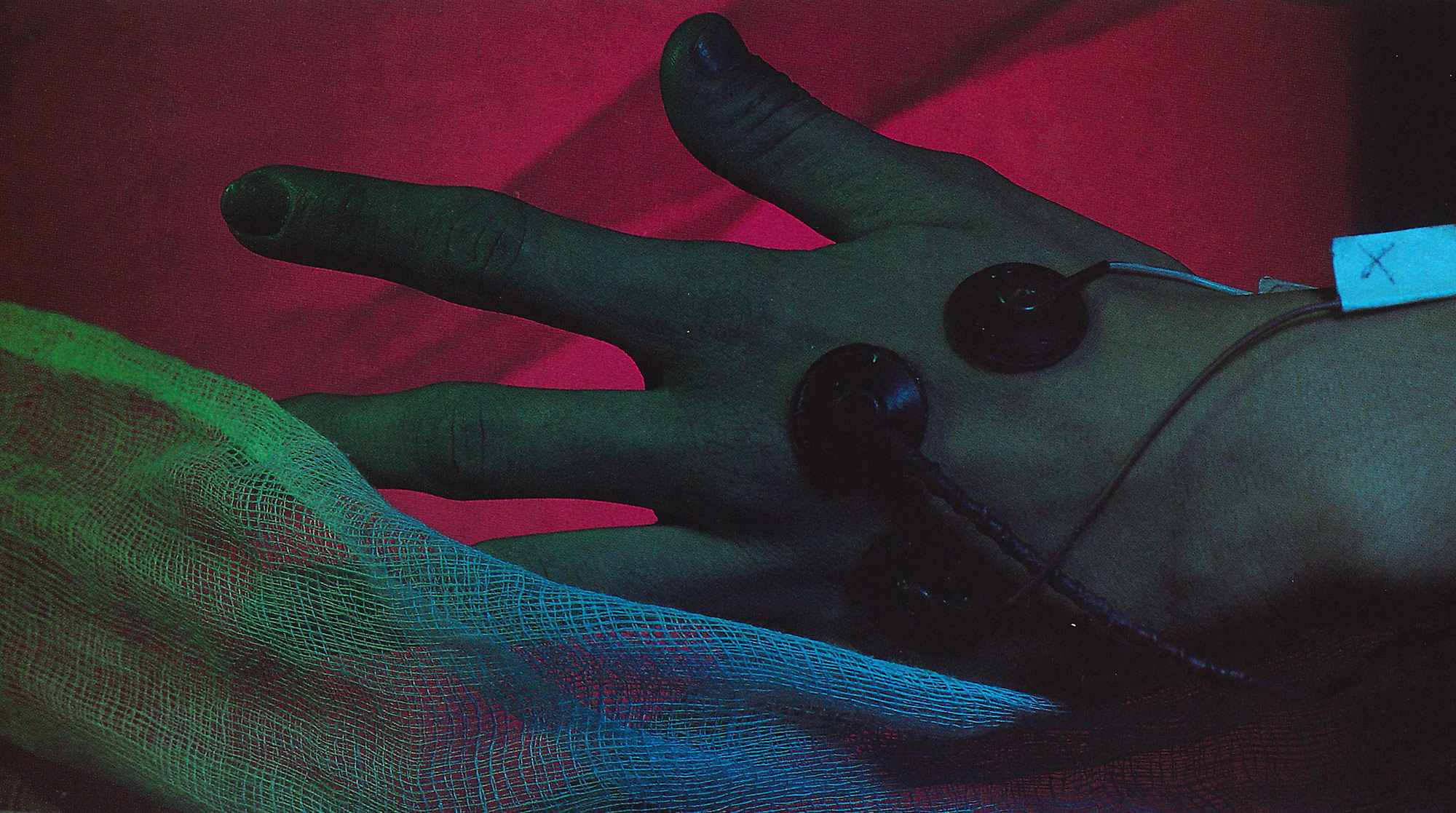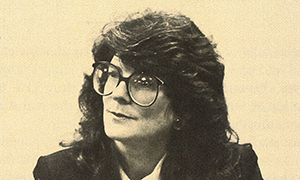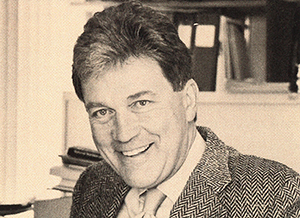The human factor The human factor Human volunteers are the key to UW research
Without human volunteers, vital UW research and the possible cures it generates wouldn't take place.

Without human volunteers, vital UW research and the possible cures it generates wouldn't take place.
It’s tempting to call them human guinea pigs. Human subjects or volunteers are more accurate, albeit duller, descriptions. But without people like 80-year-old Monte Morton and two-year-old Rachel Erwin a substantial amount of the research at the University of Washington would stumble to a halt.
Morton and Rachel are among nearly 25,000 people—a number that virtually matches the UW’s undergraduate enrollment—who volunteered to be human subjects last year. They are an essential element in a record $430 million in funded research during 1992-93. Without their service, the UW would have a hard time staying the top public university receiving federal research dollars or pioneering such revolutionary procedures as kidney dialysis or bone marrow transplants.
Morton is part of a group of sudden cardiac arrest survivors who are testing a stress reduction program to see if it lessens their chances of having a second heart attack. Rachel participated in studies that showed infants learn by imitating the actions of other babies.
Elsewhere around campus, volunteers are being injected with experimental AIDS vaccines or a male contraceptive. Others are being tested to see how people make decisions in emergency situations, are having their sleeping habits monitored in a laboratory or are watched while they perform certain tasks under the influence of alcohol.
“How much can you ask a laboratory rat or a baboon about how they are feeling? If you are going to study and treat people you have to ask people questions.”
Monica Jarrett, research assistant professor
Human volunteers fueled these and about 2,500 other UW research projects last year. Without their help, a significant amount of research currently under way would have been impossible. “How much can you ask a laboratory rat or a baboon about how they are feeling? If you are going to study and treat people you have to ask people questions,” says Monica Jarrett, a research assistant professor of psychological nursing who is studying the health of working mothers and women who may have irritable bowel syndrome.
David Dunner, professor of psychiatry and behavioral science and director of the UW Center for Anxiety and Depression, agrees. “We can’t do our work without human subjects. You can’t study depression without seeing people with it.”
Before Jarrett, Dunner or any UW researcher has the opportunity to work with human subjects, they first must have their proposal reviewed and approved by one of the three UW Human Subjects Review Committees. This can be a tedious process that many researchers grumble about. But the procedure is mandated by federal regulations and is designed to minimize any potential physical or psychological risk to subjects.
What researchers can and can’t do with volunteers is strictly controlled. Gone are the days when unscrupulous scientists sometimes took their work to a prison or mental hospital and used inmates or patients as human subjects without their consent. One notorious case of human subject abuse took place in the 1950s, when the CIA tested LSD on unwitting subjects. One person committed suicide during that experiment.
Today, the rules require that subjects be fully briefed about the scope of a project and told exactly what they will be asked to do. Volunteers also must be told that they can halt their participation at any time they choose. In addition, researchers must share the results of their findings with their human subjects once a project is completed.
What motivates thousands of people to have their arms pricked by needles, to embark on an exercise program for the first time in their lives, to test a new antidepressant medication or to have their behavior probed? There are thousands of reasons. Curiosity, altruism, guilt and a desire to make a contribution to society are common themes. Money—volunteers in some studies that require frequent blood draws or involve a large time commitment sometimes are paid up to several hundred dollars—doesn’t seem to be a big inducement.
“I know from my work that most research on heart trouble in this country has been on men. That ticks me off,” says retired Seattle newspaper reporter Lettie Gavin, who is participating in a study of the hormonal effects on heart disease in women. “When I read about this study I jumped in. I met all the criteria including having heart trouble. I never had time before to participate and with this study I felt I could make a contribution.”
“I owe the system a debt,” says Bob Martin of Kirkland, who is in a stress reduction and management study for heart attack victims. “In 1989, Medic One came out and jump started me three times and shot me full of the drug TPA. It was being tested at the time and I got the real stuff. I feel I should do anything I can to help.”
Terry Podoll, a graduate student in medical chemistry, thinks his participation in male contraceptives studies for the past three years is important. “I’m excited for men to be responsible for this kind of behavior. My wife loves it. She always had problems when she was on the pill so we’ve had to struggle with contraception. I like to share my experiences with other guys, so taking part in these studies breeds interesting conversation.”
Karen Penny Elwin, the mother of two-year-old Rachel, signed her daughter up for research into how infants learn. “I was curious and interested to see how Rachel was developing in relationship to other children her age. I was interested to find out what the researchers (Psychology Professor Andrew Meltzoff and graduate student Libby Hanna) learned and hopefully it will allow me to help my daughter in some way.”
“Cures don't come out of nowhere. Ultimately they have to be tested on humans or we won't know if they work.”
Martha Levine, community activist
Some of the most compelling stories from volunteers come from individuals involved in AIDS vaccine trials. The UW is one of five institutions across the country conducting trials of potential AIDS vaccines.
“Volunteering is way of keeping and fostering hope,” says Judy Gough, an Auburn insurance agent whose brother died of AIDS. “He came to live with us in May of 1992 and immediately became very ill. My husband and I were his primary caregivers and I was always involved with his life. After he died we were left with a need to do anything we could to stop this terrible, terrible disease.”
“Cures don’t come out of nowhere. Ultimately they have to be tested on humans or we won’t know if they work,” says Martha Levine, a Seattle community activist. “I have friends who are HIV positive and friends who have died of AIDS. I feel very helpless. This is something I can do so another generation won’t have to worry about this disease.”
Guilt pushed health care worker Zane Pratt into volunteering. “I feel like some Jewish people who are guilty because they survived the holocaust. I’m gay and I feel guilty because I’m not being punished. I don’t have AIDS, but I have a brother who has been HIV positive for 14 years. I’ve worked at clinics where co-workers and patients have AIDS. You get to know them and ask, ‘What can I do?’ This is something I can do and it could be a real contribution. I might even luck out and be tested on a vaccine that really works.”
Jon Rider, ’63, the executive director of the UW Alumni Association, and his wife Ellen, ’63, also are participating in the trials and serve on a citizens action board to recruit other people. They see their action as a potential present for their children.
“We read about the trials two years ago in the paper and fit the bill for volunteers. We are aware of the need to continue testing new vaccines and figured this is something we could do to help. We have four kids who are in the age group that is at high-risk for acquiring AIDS and thought this might be a gift we could give them,” he says.
“I spent 27 years in the Marine Corps and they are always sticking you or giving you something. The trials are easy. I’ve given several oceans of blood and been given a series of shots. Ellen and I are not rich enough to give much to charity but it is important that we contribute to society. This is something we can do. There are still a lot of people who think AIDS is only a disease of gay people or needle pushers. It isn’t. It’s a disease of everyone.”
In AIDS research and other fields, recruiting volunteers can be a daunting task. Back in the mid-1970s, Dr. Robert Knopp, director of the Northwest Lipid Research Clinic, had a devil of a time finding enough men with high cholesterol levels for a pioneering study that ultimately showed lowering blood cholesterol can prevent heart disease. Over two-and-a-half years Knapp’s team screened more than 50,000 people after instituting a cholesterol testing program for the entire Boeing work force. Later, the researchers also checked city of Seattle and King County employees and finally recruited subjects at shopping malls to come up with the 340 men who were ultimately tracked for 10 years.
Recruitment for most studies tends to be more conventional. Researchers rely on news stories and paid advertisements in Seattle-area newspapers and the Daily, public service announcements on radio and television, referrals from physicians, word of mouth and those ubiquitous flyers with tear-off telephone numbers that seem to sprout on virtually every UW bulletin board.

Elizabeth Loftus
Psychology Professor Elizabeth Loftus is a prodigious consumer of human subjects. She’s employed about 20,000 of them while exploring human memory over the last two decades. Loftus always seems to be collecting data. She has been known to question fellow passengers in airport terminals when traveling and often hands out questionnaires to audiences when she gives lectures. Loftus also used King County juror lists to recruit subjects for one study and rode state ferries to interview commuters for another project.
Loftus and her psychology department colleagues are probably the biggest users of student volunteers on campus. Being a human subject can be an important educational experience, says Frank Small, professor of psychology and head of the department’s human subjects pool.
Small feels it is “an ideal way of learning about research from the inside out. Students get an appreciation for the process of science and see how ethical researchers carry out their work. I think researchers should be human subjects themselves before they carry out experiments on other people.
“Science is a serious business, but it also can be fun. I look at collecting data as fun and students can pick this up from a teacher. That enthusiasm can be infectious. I have students in my introduction to psychological research class say they got interested because of their participation as human subjects,” Small adds.
Psychology students also have a very practical reason for volunteering—they improve their grades. Students receive 0.1 grade points for each two hours they contribute as human subjects up to a maximum of 0.3 grade points.
But there are other, far stronger bonds between researchers and their subjects.
“Most people don’t come to our clinic to be research subjects. They come to get better,” explains psychiatrist Dunner. “We will continue to treat people after a study is completed and I have some clients that I’ve continued to see for 10 years at no charge. How we treat these people is very important to us.”

Robert Knopp
Cholesterol expert Knopp, whose clinic may have as many as 15 studies going on at any one time, agrees. “When people participate in one of our studies they get a tremendous amount of medical care and love. People benefit from their participation and information is sent back to their doctor. At the end of a study we just don’t say good-bye. We can follow subjects in our outpatient clinics.”
Before they can recruit, researchers must jump over the hurdle of human subjects review policies. “A lot of investigators are irritated by the human subjects process and see it as an impediment. In the last 14 years I’ve seen the consent forms that subjects have to sign get longer and longer,” says Dunner. “However, the review process is important. It protects the patients and the investigators from getting caught in something they don’t want to do. Just as important, it makes sure subjects know what is going to happen to them.”
The stringent regulations also help maintain a safe climate for research in Seattle, says Helen McGough, manager of the human subjects division, a part of the UW Office of Research. “This is a very research-oriented community. The Fred Hutchinson Cancer Research Center and Battelle Seattle Research Center also review human subject applications the way we do. There have been cases in the past where people not affiliated with the University were using the telephones to recruit or harass women with phony sex surveys. We have to stay vigilant and we encourage potential subjects to make sure the research they are being recruited for is legitimate.”
McGough and her staff annually check a mountain of paperwork that accompanies 2,500 proposals to use volunteers. In addition, they coordinate the work of three human subjects review committees—two for biomedical research and one for behavioral research. The committees have the ultimate say in approving or rejecting any research that employs human subjects.
Not all proposals get as far as a review by a full committee. Last year McGough’s office diverted nearly 1,000 projects for speedier permission. Half of those, posing little or no risk to volunteers, are passed on to their home department for approval. The other 500 proposals, which present minimal hazards to people—such as giving one blood sample, are forwarded to a subcommittee of a full review panel.
Each of the review committees has nine members. Federal rules require that one person on each panel comes from off campus and that a second is not scientifically trained. This is to ensure that volunteers have an advocate. In addition, McGough says each committee has a student member, since students frequently volunteer to be subjects.
“Ninety-eight percent of all proposals are approved the first time they come before a committee and 99.8 percent are ultimately approved,” says McGough.
“Over the past five years perhaps just five applications were turned down. That’s a drop in the bucket. Usually the investigator and the committee work together so the research is approvable.
“The bottom line in rejecting any application to use human subjects is that the risks outweigh the benefits of the research,” she says.
The whole process of review, approval, recruitment and testing is like making a contract, says Roger Roffman, an associate professor of social work whose research covers such areas as AIDS prevention, substance abuse and domestic violence.
“We provide subjects something fresh based on a researcher’s belief that it may bring in some new knowledge or treatment. In return we ask that we are allowed to learn from our subjects and get far into their lives so we can probe their feelings, attitudes and motivations,” he says. “It can only be done with live people.”